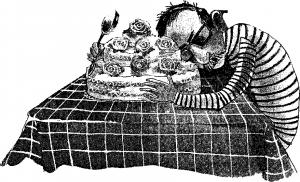Children from HIV-infected people: are there any chances of having a healthy child? HIV is transmitted from a sick mother to a child. The child is infected with HIV from the mother.
Mom is a calling. Being an HIV positive mother is a challenge. Why? We bring you personal stories from local HIV-positive mothers who spoke about their lives, experiences and children.
Alexandra, 40 years old:
I have been living with HIV for 15 years. Now I have two children: the eldest is 21 years old, the youngest entered first grade this year. When I gave birth to my first child, I did not yet have HIV. I gave birth to my second one with status.
I found out about my second pregnancy by accident. I was 33 years old, I was then working abroad and at some point I realized that something was wrong. When I went to the doctor, it turned out that I was expecting a child. And just a month before that, I developed hepatitis B and C. Considering all my illnesses, the news of pregnancy came as a shock.
Naturally, I decided to have an abortion, but they refused. I remember how I finally found one woman gynecologist who agreed to perform the operation for money, but on the condition that the fetus would be no more than 13 weeks old. I went for an ultrasound, and it was already almost 18 weeks. I left the office, crying over this piece of paper. A nurse comes up to me and asks: “What, pathology?” I say: “No, absolutely healthy.” How she began to scold me, persuade me, tell me, convince me. After some time, after weighing all the pros and cons, I made a firm decision to give birth.
I returned to my homeland and registered. And then they began to dissuade me from giving birth, they frightened me with pathologies. Only in the infectious diseases department they reassured me and gave me confidence. When I was prescribed an ARV, I was stubborn to the last. I was then convinced that pregnant women should not take any pills at all. But after some time I gave up and started the course. Up until the birth, I didn’t have a single side effect, it was as if I was taking paracetamol.
I gave birth myself, although the doctors set me up for a caesarean section. Everything went well, no complications, the baby was born healthy, and I didn’t worry a bit about him, as I regularly followed all the doctors’ recommendations.
After pregnancy, I stopped taking ARVs, but when my little one turned three years old, my immunity completely dropped, it was simply undetectable, I then had pneumonia 8 times - and I started taking therapy again, this time constantly. The side effects were terrible, but thanks to the support of friends and family, I survived everything.
What helped me overcome difficulties and experiences? Positive attitude and self-confidence. I remember being in the hospital and hearing conversations in the corridor: “There are women who are sleeping here.” I was never silent, I always came out and directly said that it was unpleasant to hear this and that we, people living with HIV, are no different from others.
I remember when my little one grew up a little, I went around to all the doctors who had once persuaded me to have an abortion. It was important for me to prove to them that with status it is possible to carry and give birth to a completely healthy baby.
The eldest daughter knows about my status; in her youth she worked as a volunteer at a youth-friendly clinic, and when I told her everything, she took it very calmly.
The youngest son sees that I take therapy, he even sometimes brings me pills if I suddenly forget to take them. But he thinks they are vitamins. I plan to talk to him when he is at least 13-14 years old.
I really want to do everything so that he does not repeat my negative experience, so that he only learns the good. Just recently we were driving from the sea and got stuck at customs. Seeing the sniffer dog, the son asked: “What are the dogs looking for?” “Drugs,” our dad answered honestly. “What is this?” - and then dad told him everything in detail, but in a very literary way. With such small steps we want to lead him to adulthood with a clear understanding of good and bad.
Tamara, 28 years old:
I found out that I have HIV during pregnancy. Before pregnancy, I used drugs (now I have been sober for more than 5 years). Then the news that I was infected did not surprise me much.
When the results of the analysis became known, I was asked to come to the sanitary and epidemiological station. I remember how the doctor, after long and humiliating questions, told me: “You have to have an abortion - you will die, and the child will be born sick.” I didn’t listen to him and went to the infectious diseases hospital, where they told me in detail about ARV therapy and that by taking it, I could give birth to a healthy baby and live happily ever after.
I started taking therapy immediately, no side effects I didn’t, the pregnancy was very easy. I experienced stress when I was admitted to the hospital to monitor the start of ARV. The fact is that before this I had never been in a hospital.
When the time came for childbirth, I went to a regular maternity hospital... and there I experienced first-hand what discrimination is. From the first day, the doctors forbade me to use the communal shower and asked me not to leave the room.
After giving birth, I stopped taking ARVs, those were the rules then. But when my daughter turned 6 years old, my CD4 cell levels dropped below 350 and I started therapy.
For the first year and a half of our daughter’s life, we were constantly worried. Even though she was taking prophylactic treatment and I was not breastfeeding, it was necessary to be tested for antibodies at certain intervals. I remember how my hands shook and my voice disappeared when my husband or I called the laboratory to find out the result. And how we sighed with relief when we found out that it was negative. At two years old, we were given a certificate that our girl was completely healthy, and we finally began to live in peace.
My daughter doesn’t know about my status. When I take pills, I say that it is a medicine for the liver. I plan to tell her everything, but in a couple of years. We have a trusting relationship, but I still have to prepare her for this news, otherwise she will not perceive it the way I would like.
Olga, 35 years old:
My daughter is now 10 years old, I became infected with HIV when she was 2.5 years old. When I found out about my status, my daughter was very sick, and I simply did not have time to become depressed.
I was always surrounded by people who supported me in everything, no one ever turned their backs on me because of my status. When I divorced my husband and tried to build a new relationship, I never hid my status. I remember when my daughter turned 4 years old, I constantly thought: “I wish I could live to see the moment when she learns to speak well, and then come what may.” Then there was a period - “I wish I could live long enough for her to go to school.” Now I’m in the period of “I wish I could live to see my grandchildren, and then we’ll see...” (smiles).
One day, my daughter was about 6 years old, she came to my work and just before leaving, when I was signing in the magazine, she said at the top of her voice: “Do you have HIV?”
I have been taking antiretroviral therapy for two years. My daughter doesn’t know what it is; in our family we call the pills “vitamins.” She knows where they are, sometimes she brings them to me herself if I forget.
One day, my daughter was about 6 years old, she came to my work and just before leaving, when I was signing in the magazine, she said at the top of her voice: “Do you have HIV?” I turned white, my heart sank, but I pulled myself together and asked her: “What?” And she: “The poster says “Do you have HIV?”
Due to the nature of her work, my daughter often hears conversations about HIV infection and hepatitis. Therefore, at the age of 10, she already knows how HIV differs from AIDS, how this infection is transmitted, what hepatitis is, and so on.
I try to instill in her a tolerant attitude not only towards people living with HIV, but also towards people with disabilities and people with mental disabilities. I’m not sure that everything would have been the same if I didn’t have a positive status myself.
I don't know what my life would be like if it weren't for my child. I have someone to continue doing something for, and this is very important to me.
I used to think that my daughter would grow up and it would become easier for me. But it grows, but it doesn’t get easier, because every year there is more responsibility. The older she gets, the more attention she requires.
The main principle in our family is never to lie, we all try to adhere to it in all situations.
By the time I turn 16, I plan to tell her about my HIV status. I can’t do this yet, because she is very afraid of death, and any serious illnesses she is associated with this. When her attitude changes, we will sit down and discuss everything. I will try to prepare her for this, and I am very afraid that she will learn about everything from someone else. I don’t think this news will come as a shock to her, we have a trusting relationship, and she will understand me.
The names of the characters have been changed.
Recorded by Elena Derzhanskaya
A slowly progressive infectious disease caused by retroviruses that attack the immune and central nervous system, with the development of an immunodeficiency state leading to the death of the patient from opportunistic infections and tumors - this is HIV infection (infection caused by the human immunodeficiency virus). From this article you will learn about what kind of children are born from HIV-infected mothers.
HIV carriers
There are three groups:
- HIV-infected people without clinical manifestations;
- HIV-infected people with nonspecific manifestations;
- patients with clinical manifestations of AIDS.
First group: regimen and nutrition according to age, physical activity without restrictions. Examination once every 3 months, once a year - in a specialized hospital with a full clinical and laboratory examination to decide on preventive therapy.
Second group: gentle regime with additional daytime rest; Schoolchildren are allowed to study at home. Meals 4 times a day. Examination once a month, clinical and immunological examination - 2 times a year in a hospital setting.
Third group: children are observed in an infectious diseases clinic until recovery or stable remission after opportunistic infections. In the future, home inspections 2 times a month. The motor mode is determined by the state physical development, the presence of concomitant diseases.
Birth of a child to a mother with HIV
Children born to HIV-infected mothers should be under medical supervision. Monitoring of children with perinatal contact is carried out by a pediatrician at the City Center for the Prevention and Control of AIDS. Recommended timing of the examination according to the Order of the Committee on Health and the Center for State Sanitary and Epidemiological Surveillance in St. Petersburg No. 29-r/4 dated 02/04/2002: at birth, at 1 month, 3, 6, 9, 12, 18, 24 months. If clinical and laboratory signs of HIV are detected at the age of 12 months, an additional examination is carried out at the age of 15 months.
At the specified time, the physical and psychomotor development of the child is assessed, blood tests are examined (clinical and biochemical, immunological - CD4, CD8, CD4/CD8), urine tests, and diseases associated with HIV infection are recorded. Serological blood testing is periodically repeated using ELISA for markers of hepatitis B and C, HSV, CMV, toxoplasmosis; perform a cytological examination of saliva and urine for CMV. The content of immunoglobulins and proteinogram parameters are determined once every 6 months.
Prevention
Specific prevention for children born from HIV-infected mothers and patients with HIV infection is carried out with killed and recombinant vaccines. If children do not have clinical manifestations of HIV, tuberculosis is prevented with the BCG-M vaccine from 6 months of age. The recombinant vaccine against hepatitis B can be used from the first hours of life according to the scheme 0 – 1 – 2 – 12. Poliomyelitis is prevented within the prescribed period, but only with killed vaccines (Tetracok, Imovax Polio). DTP vaccines (ADS or ADS-M) are administered to HIV-infected people, including those with clinical manifestations, according to the standard regimen, however, in case of severe immunosuppression, it is recommended to monitor the titers of anti-diphtheria antibodies 1-2 months after the course of immunization and, if necessary, additional administration of DPT -M – toxoid.
What to do if an HIV-infected child is born?
Live vaccines against measles, rubella and mumps (single-drug and associated) can be administered to children after a diagnosis of HIV infection has been established in accordance with the vaccination schedule only in the absence of clinical manifestations of the disease. Additionally, HIV-infected children are also recommended the administration of killed influenza vaccines, polysaccharide vaccines against meningococcal and pneumococcal infections, as well as vaccines against hepatitis A and Haemophilus influenzae.
Azidothymidine (AZT) is used to prevent perinatal infection: starting from the 14th week of pregnancy until delivery, women receive AZT orally 100 mg 5 times a day. In the 1st stage of labor, the drug is prescribed intravenously during the first hour at a dose of 2 mg/kg, subsequently the infusion continues until the expulsion period at a dose of 1 mg/kg per hour. For a newborn from 8-12 hours of life, AZT is given orally in the form of syrup every 6 hours at a dose of 2 mg/kg or intravenously at a dose of 1.5 mg/kg. Treatment continues for 6 weeks.
For emergency prevention perinatal HIV infection use a single oral dose of nevirapine to the mother at the beginning of labor activity at a dose of 200 mg, for a newborn during the first 72 hours of life at a dose of 2 mg/kg. Children from HIV-infected mothers should not receive breast milk to prevent infection of the newborn.
As of 2017, about 900,000 HIV-infected people live in Russia. AIDS is called the plague of the 21st century. Can an HIV-infected woman give birth to a healthy baby, how to minimize the risk of transmitting the virus to a child, what should spouses with HIV who are planning to add to the family remember? Obstetrician-gynecologist of the Kemerovo AIDS Center Olga answered these and other important questions to Daily Baby Korosteleva and epidemiologist, head of the prevention department of the Kemerovo Regional Center for the Prevention and Control of AIDS and Infectious Diseases Zhanna Berg.
If a woman has HIV, does this mean that she is condemning her future children to this disease? What is the likelihood of a baby becoming infected?
Today, HIV is not an indication for termination of pregnancy. HIV-positive women get married, become mothers and, subsequently, grandmothers of completely healthy children and grandchildren. If the expectant mother is a carrier of HIV, this does not mean that the child will certainly inherit the disease.
With timely preventive measures, the risk is reduced to 1-2% and even to zero percent.
If prevention is not carried out, the risk of a child becoming infected with HIV increases significantly. The probability in this case during pregnancy is about 25-35%, during childbirth - 40-65%, during breastfeeding - from 12 to 29%.
When can mother-to-child transmission of HIV occur?
Infection often occurs during pregnancy: virus from the bloodstream expectant mother is able to penetrate to the fetus through the placenta - the organ that connects mother and baby. Through it the child receives oxygen and nutrients from the mother's body, but the blood of the mother and baby do not mix. The placenta must protect the baby from pathogens of various infections found in the maternal blood, including HIV. But this is normal.
If the placenta is inflamed or damaged, which can happen with abdominal injuries or infectious diseases, its protective properties are significantly reduced. In this case, there is a risk of transmission of HIV infection to the fetus from the mother.
It is possible that you can become infected with the virus during childbirth. There are two ways of transmission of infection: the first is when the baby passes through the birth canal - through the cervix, vagina - his skin may come into contact with the mother’s blood and vaginal secretions, which contain HIV. There are wounds on the baby's skin through which the virus can enter the body. The second way is when passing through the birth canal, the child often accidentally swallows maternal vaginal discharge and blood. In this case, the virus can enter the child’s body through the mucous membranes of the mouth, esophagus and stomach.
A baby can also become infected during breastfeeding: either through milk, because it contains HIV, or through blood - if the mother’s skin around the nipple is damaged, then the baby receives blood along with the milk, and this is an additional risk of infection.
What measures should a pregnant woman with HIV take to maximally protect her unborn child from infection?
A pregnant woman with HIV must immediately register with the antenatal clinic at her place of residence, like all pregnant women, and be sure to additionally register with a specialized AIDS Center. The sooner the better. Here, after a special examination, the woman will be prescribed antiretroviral therapy.
Antiretroviral drugs are as safe as possible, so pregnant women and newborns can safely take them to prevent infection. They must be taken throughout pregnancy, right up to birth, and the newborn must be given medications.
It is known that HIV is transmitted through blood, semen, vaginal discharge and mother's milk. It turns out that an HIV-infected woman will not be able to breastfeed her baby?
Yes, you are right, HIV is transmitted to a woman through blood and semen. A child can become infected when breastfeeding. Therefore, it is very important for an HIV-infected mother to stop breastfeeding.
To avoid infection, we strongly recommend that HIV-positive women do not breastfeed or feed their children breast milk.
Will the pregnancy of a woman with HIV be accompanied by additional risks and complications?
First of all, it is important to understand that an HIV-infected woman is able to carry and give birth to a healthy baby. But it should be remembered that during pregnancy physiological suppression of the immune system occurs, this is quite natural. This often leads to the fact that the development of HIV infection can accelerate. A woman needs to consult with an infectious disease specialist to determine the state of the immune system, the stage of HIV infection and prognosis for her health.
How to plan pregnancy for HIV-infected spouses?
Practice shows: the more attention is paid to pregnancy planning and preparation for it, the better for the mother and her unborn child. The greater the chance of giving birth to a healthy baby and not getting complications during pregnancy.
When preparing for pregnancy, take a blood test to help determine your viral load. At high levels, it is very important to ensure that the number of lymphocytes returns to normal and viral activity decreases.
If pregnancy has already occurred, immediately, at any stage of pregnancy, contact the AIDS Center for examination and preventive action.
What percentage of HIV-infected women give birth to healthy children?
With timely and complete three-stage prevention - during pregnancy, childbirth and the newborn - the risk of transmitting HIV from mother to child is very small and ranges from 0% to 2%.
What preventive measures should be taken in relation to an infant born to an HIV-infected woman?
Prevention measures are very important in the event of a child being born to an HIV-positive woman. To keep your baby healthy, remember three main preventive measures:
- antiretroviral prophylaxis immediately after birth (the baby should be given medicine in the form of syrup);
- refusal to breastfeed;
- examination by a pediatrician at a special AIDS center.
What advice can you give to HIV-infected women who find out they are pregnant?
First of all: immediately contact the AIDS Center at your place of residence for examination and to receive preventive treatment to prevent transmission of the virus from mother to child.
Observations regarding pregnancy in HIV-positive women should be carried out strictly as prescribed by the attending physician.
In order for preventive measures to have the desired result, that is, for your child to be born healthy, it is very important to strictly follow the medication regimen. If a pregnant HIV-positive woman violates this regimen, for example, often skips medications, takes less than the prescribed dose, or does not observe the required intervals between medications, then the risks of transmitting the virus to the child increase significantly.
From the author: A cure for HIV that will completely rid an infected person of this disease has not yet been found. But HIV-positive people can live a full and long life if they follow all the doctor’s instructions and take the necessary measures. Moreover, people with HIV create happy families and give birth to healthy children. It is only important to approach pregnancy responsibly and do everything to prevent the baby from contracting the virus.
HIV infection changes the lifestyle of those with large number restrictions may harm the health of future babies. Are HIV and pregnancy compatible? Don't lose sight of the seriousness possible consequences in such a situation, however, there is a chance to become the mother of a full-fledged baby.
How can an HIV-infected woman give birth to a healthy child? This is not an easy task. To achieve the goal, the efforts of the obstetrician, infectious disease specialist and the patient herself must be combined.
Human immunodeficiency virus is a gradually developing disease characterized by chronic form currents. The disease causes damage to the immune system, central nervous system and other organ systems with the subsequent development of AIDS. The thermal stage of the disease inevitably leads the patient to death.
Attention! A blood test for HIV is taken by any pregnant woman upon registration at the antenatal clinic.
How can a child become infected?
Can someone with HIV give birth to children? How will this affect the woman and child?
If the patient knows about the ongoing disease, she should not assume that HIV during pregnancy will lead to a deterioration in her well-being. Unpleasant consequences often arise due to the development of secondary ailments and bad habits women. The virus does not have negative influence on the development of the fetus, the main danger is the possibility of infection of the baby during childbirth.
The infection is transmitted from a sick mother to a child in three ways:
- during gestation (in utero);
- during childbirth, women with HIV infection;
- when breastfeeding.
Children born to HIV-infected mothers who do not take any measures to prevent the baby from becoming infected are born sick in 30% of cases. If appropriate therapy is started during pregnancy, the probability of infection of the child is 2-3%.
Thus, children born to HIV-infected mothers are highly likely to be healthy.
Diagnosis of HIV during pregnancy
Testing for HIV infection during pregnancy is one of the mandatory measures. How many times during pregnancy is such a test used? Ideally, women planning a pregnancy donate blood for HIV 4 times:
- when planning a child;
- upon registration;
- in the third trimester;
- after childbirth.
You can take an HIV test during pregnancy at any time if the woman has not previously donated blood for some reason.

Blood tests for the virus in patients during pregnancy are taken from a vein. In some cases, an HIV test may be false positive. This examination result in the case of pregnant women is observed quite often.
Reaction to an imaginary virus when false positive result may be explained by the presence chronic illnesses from the expectant mother. In addition, paternal DNA enters the woman’s body, which acts as a virus for the immune system - the amount of antibodies produced in this case is the reason for a positive reaction.
Virus and pregnancy
Let’s say a married couple is planning a pregnancy if there is HIV infection in the blood of one or both partners. What are the features of such a case? Will pregnancy increase the intensity of the symptoms of the disease? And finally, how to prevent a child from becoming infected?
What are the dangers of pregnancy for a woman?
At what cost will a sick woman have healthy children? How dangerous is pregnancy for an HIV-infected woman?
HIV in pregnant women manifests itself similarly to the symptoms of the disease in healthy women. However, one should take into account the double effect of weakening the immune system of an HIV-infected patient during pregnancy.
Firstly, the expectant mother’s body “slows down” the immune system to prevent embryo rejection, and secondly, the developing disease naturally destroys the protective function of the woman’s body.
Under such circumstances, the risk of developing and acquiring complicated forms of concomitant ailments increases, which the expectant mother cannot avoid.
The pregnant woman’s body is supported by traditional highly active antiretroviral therapy, which is carried out throughout pregnancy (from the third month); a few weeks before giving birth, the pregnant woman is admitted to the hospital.

Can an HIV-infected woman give birth to a completely healthy child: expert opinion
An HIV-infected patient can give birth to a healthy baby. It is possible for infected women to give birth, since the achievements of modern medical science make it possible to reduce the risk of infection of a child born or developing in the womb.
However, it is worth noting that the risk of having a sick baby increases somewhat in pregnant women with a late stage of the disease, as well as those who, due to a weakened immune system, have a fairly high level of viral load.
The risk of infection of the baby also depends on the method of delivery. In the case of a sick woman in labor, it is possible to perform a natural birth (with a viral load of no more than 1000 in 1 μl), however, in order to minimize the risk of infection, abdominal surgery is used.
What care does the mother need during pregnancy?
In most cases, pregnant women do not experience any problems with HIV infection. They need the same prenatal care throughout their pregnancy as healthy mothers-to-be. There is no evidence that women who are ill should receive more frequent counseling than usual (except in cases of complications).
Starting from the second trimester of pregnancy, patients are prescribed specific therapy.
Complications
An HIV-infected pregnant woman may face a number of complications during pregnancy (birth) of a child. So, if the positive result of the HIV test is not false, a woman should prepare for premature birth from the first months of pregnancy.
Another obvious consequence of the development of the virus is AIDS, which burdens pregnancy with various kinds of pathologies. A special place in this list of diseases is given to ailments of a viral, fungal, and bacterial nature. These diseases, depending on general condition organism, in pregnant women they are often complicated.
And finally, the main complication of HIV-infected pregnancy is transmission of the virus to the child in the womb, during the birth of the baby by cesarean section or after surgery (natural birth) while breastfeeding.
Problems conceiving in HIV-positive parents
The possibility of having a healthy child born to infected parents (or one of them), as we found out earlier, is quite high. However, such couples often face various difficulties. The process of conception in HIV-positive parents requires special attention, and care for the newborn is not carried out in the usual way.
Couples in which only one partner is sick must use a barrier protection device - a condom - during sexual intercourse. There are also special methods and recommendations to protect a healthy partner when conceiving a child.
Important!“Special couples” are concerned about the possibility of having a child in traditional conditions. Where do HIV-infected people give birth? Each maternity hospital has special blocks for this class of women in labor - here all the necessary manipulations necessary during the birth process and during the recovery period are carried out.
If both partners are positive
The main danger in the case of HIV-positive status (presence of acquired immunodeficiency syndrome) of both sexual partners is the effect of infection on the fetus, i.e. infection of the child. There is also a risk of transmission of treatment-resistant variants of the virus through contact with a partner.
Before becoming pregnant, a woman and a man must undergo full examination, consult with specialists to determine the risk of negative viral effects on the fetus.
If the mother is infected
If a woman does not become infected from the future father of the child, there is a clear need to protect the man’s body from infection. To eliminate the risk of infecting a partner when planning a pregnancy with an HIV-positive status, women prefer self-insemination. For this purpose, the seminal fluid is collected in a container, and the expectant mother uses it on days favorable for conception for its intended purpose.
When the first signs of pregnancy appear, the patient should consult a doctor for further registration and management of pregnancy.
Among pregnant women there may be those who are completely healthy and want to have a child from a sick man. What to do in such a situation? What have people come up with to protect mother and baby? Let's move on to the next point.
If the father is infected
Are healthy children born from sick fathers? Let us immediately dispel doubts: a woman can give birth to a healthy baby from an infected father.
In such a situation, the woman’s high risk of infection is obvious. To minimize the likelihood of infecting a partner, firstly, a young man should not neglect the condom during sexual intercourse. Unprotected sex under such conditions is permissible only on days favorable for conception. This measure will not only protect the woman, but will also allow her to conceive, reducing the risk of the child becoming infected if the father is HIV-infected.
The second option is sperm purification using the separation method (separation of dead sperm from living ones). The disadvantage of such a procedure is its high cost, as well as the possibility of application only in the case of a sufficient concentration of healthy sperm in the patient’s seminal fluid.
As mentioned earlier, the baby can become infected when it is born. We will tell you below how to avoid infecting a newborn during childbirth.
Preventing newborn infection
If the expectant mother is HIV-positive, she needs to know and adhere to a number of recommendations:
- follow all medical instructions. Get examined in a timely manner and regularly visit your doctor;
- eat right and lead healthy image life. This approach is part of the prevention of complications during HIV infection, as well as a guarantee of normal fetal development;
- follow preventive measures to prevent premature birth. A premature baby has an increased risk of infection;
- treat chronic diseases and acute diseases;
- Plan a caesarean section at 38 weeks. The decision to perform an operation is made by a clinic specialist;
- stop breastfeeding. The milk of a sick mother contains a virus. As an alternative, an adapted milk formula is used.
- adhere to prescribed antiretroviral therapy.

How to protect your baby from the virus after birth
In order to prevent infection, a child born to a sick woman is prescribed special medications, regardless of the specific treatment of the woman during pregnancy.
Therapy begins 8 hours after the end of labor. Until this moment, the effect of the drug that the mother took continues. Great value has a time interval between the birth of the baby and the first dose of the drug. No more than 72 hours should pass from the end of labor. Otherwise, the pathogen will attach to the patient's cells.
For small children, a liquid form of the medicine is provided. They are administered through the oral cavity. The following drugs are used: Azidotimidine and Nevirapine (in a dosage calculated by a specialist).
Over the next 18 months, such children are registered. The reason for deregistration of a child may be: the absence of antibodies to the virus, hypogammaglobulinemia and symptoms of the disease.
Each infected woman has the right to decide for herself how much she needs the baby, even if the child is at high risk of contracting the virus. The main thing is that the decision made is balanced and thoughtful.
The first information about HIV infection appeared in the mid-80s and in the first years after its discovery it was called AIDS - acquired immune deficiency syndrome. According to modern data, there are currently about 40 million patients in the world. The rapid spread and incurability of this disease earned it the fame of the “plague of the twentieth century.” At present, although there is no talk of curing HIV infection yet, a timely diagnosis and competent treatment can delay the development of HIV infection to the AIDS stage for an indefinitely long period, and make the AIDS stage reversible, which means preserving the patient’s life and its quality .
Most cases of HIV infection in infants and young children are associated with transmission from mother to child. Infants and young children can become infected with HIV during pregnancy, childbirth, and breastfeeding. Typically, expectant mothers undergo double screening for HIV infection during pregnancy. If there are no examination results, then the birth is sent to specialized maternity hospitals (for example, to the Botkin Infectious Diseases Hospital in Moscow).
HIV-infected child
All children born to HIV-seropositive mothers receive antibodies to the virus through the placenta. However, only 15-23% of these children are subsequently diagnosed with HIV infection. Maternal antibodies last up to 2 years, and it is possible to definitively determine whether a child is infected only 18 months after birth. After giving birth, the child of an HIV-infected woman is registered in a children's clinic with a diagnosis of “Inconclusive test for HIV”, where it is observed until the disappearance of maternal antibodies to HIV, once every 3 months in the first year of life and once every 6 months after one year. . If, upon reaching 2 years of age, the virus is not detected in a child, he is removed from the register. He is HEALTHY!
How is HIV infection confirmed in a child?
The diagnosis of HIV infection is made to a child who has PCR method HIV RNA has been detected and is available clinical manifestations HIV infections.
Tests that HIV-infected children undergo include immune status (CD4 cell count) and viral load.
However, in children, the immune system has not yet fully developed, so the results of these tests differ from the results of adults. For example, normally the immune status of children is much higher than that of adults. In HIV-positive babies, the viral load can increase to extremely high levels (more than 1 million copies/ml) and gradually decrease during the first years of life. Using an analysis of immune status and viral load, one can judge the development of the disease in children.
Clinical manifestations of infection
The range of opportunistic infections (diseases that are not common to people with a normal immune system) in children with HIV is almost the same as in adults, except that the relative likelihood of their occurrence differs. Cytomegalovirus and toxoplasmosis are observed less frequently. Bacterial infections are more common and actually constitute the main form of secondary infections. Pneumocystis pneumonia (PP), oral and esophageal candidiasis, atypical mycoplasma infections, and intestinal protozoan infections account for the bulk of nonbacterial complications among HIV-positive children; Diagnosis and treatment of such disorders is the same as in adults.
Children with HIV infection experience delayed psychomotor development, malnutrition, and often anemia. About 50% of them are born with low weight (less than 2500 g) and symptoms of morphofunctional immaturity. Approximately 80% of children have neurological symptoms (hypertension-hydrocephalic syndrome, neuro-reflex excitability syndrome, movement disorders syndrome), withdrawal syndrome. HIV-positive children develop more slowly and begin puberty later.
Antiretroviral therapy
Only your attending physician decides when you can start therapy!
If a child has HIV-associated diseases or his immune status is rapidly declining and his viral load is increasing, therapy should be prescribed. Doctors rely on the indicators discussed above to determine when to start treatment. If, according to their calculations, the risk of AIDS in a child next year is 10% or more, it is recommended to start therapy.
When treating HIV-infected children, combinations of antiretroviral drugs should be used. The only case when monotherapy is used is a six-week prophylactic course in a child from an HIV-infected mother.
With properly selected therapy, a reduction in the amount of HIV RNA to undetectable values is achieved within 1 month. In most cases, children tolerate the drugs satisfactorily. Side effects include: loss of appetite, nausea, diarrhea, anemia.
How to keep HIV-infected children healthy?
Maintain hygiene in the house and teach the child to do this: ventilate, do wet cleaning, wash hands often, teach the child not to pick up garbage.
Organize a routine and diet for your child - eat well, walk in the fresh air and have a good rest.
Monitor your child’s oral cavity - brush his teeth and teach him to do this; if ulcers appear in his mouth, consult a doctor.
Avoid any infections and consult a doctor immediately if there are any suspicious signs of illness.
Fulfill all the doctor’s treatment requirements: give the child medications on time and correctly; do not stop therapy yourself - this may cause the development of HIV drug resistance; Consult your doctor if side effects occur.
Legal aspects
HIV is not transmitted through casual contact. Children with HIV infection are not dangerous to others:
- when sneezing and coughing,
- when staying in the same room,
- for insect bites,
- when using shared linen and towels,
- when hugging and shaking hands (skin is a natural barrier to HIV),
- when carrying out medical procedures, in hairdressing salons, if all conditions for disinfection and sterilization are met.
Upon admission to preschool educational institutions or school, parents are not required to inform the administration of the child’s diagnosis educational institution. No official (including the director of an educational institution, the head of a district or city education department, educators and teachers, etc.) has the right to demand from parents a certificate about the presence or absence of HIV infection in a child or to force parents to announce the child’s diagnosis.
The right to keep a medical diagnosis confidential, including the diagnosis of HIV infection, is not provided for by chance by law. The population in general and educators in particular are not sufficiently informed about HIV infection, and misconceptions about the nature of the disease and unfounded fears of contracting HIV are widespread. Informing the manager and staff educational institution The presence of HIV infection in a child is possible only on a voluntary basis! Today, in most countries of the world, children living with HIV go to regular kindergartens, study in regular schools, and vacation with other children in regular resorts and summer camps.
Over the years of the spread of the HIV epidemic, nowhere in the world, including in Russia, has there been a single case of transmission of the virus from one child to another in conditions kindergarten or schools.
The right to keep a medical diagnosis confidential, including the diagnosis of HIV infection, is provided for by law. HIV-infected children are disabled from childhood and receive cash benefit and benefits determined by the law of the Russian Federation.
HIV-infected children are monitored for life in specialized centers, where they receive the necessary examination and treatment free of charge.
Achievements modern medicine allow us to treat such children and give them the opportunity to live a full life, healthy life. And besides this, they need our support, kindness, love and, most importantly, they need a caring family!













